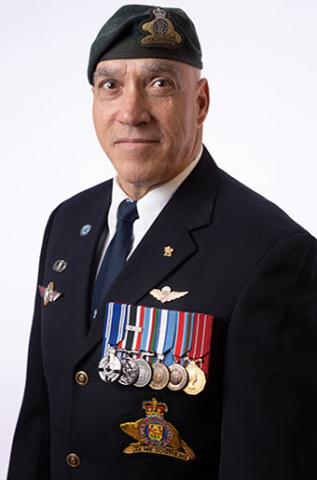
Joined
1983
Postings
- Québec City, Québec
- Valcartier, Québec
- Montréal, Québec
Deployments
- 1997 Manitoba Floods
- 1998 Operation Recuperation
- Bosnia
- Germany
- Cyprus
Daniel Massé joined the military in 1983. After completing officer training, he was posted to the 2nd Battalion of the Royal 22e Régiment at the Citadel in Québec City. During his time in the Canadian Armed Forces, he served on missions both domestically and abroad. He deployed to Germany, Bosnia and Cyprus, but also served in three major missions here in Canada.
“We were given about two hours to let our families know, get ready and leave on a school bus for Montreal.”
In 1998, he was a senior officer with the Royal 22e Régiment and supported the recovery efforts in the aftermath of the 1998 Ice Storm as part of Operation RECUPERATION.
“Before deploying to the Montreal region, we were on a winter exercise at Valcartier,” said Massé. “After receiving our deployment orders, we were given about two hours to let our families know, get ready and leave on a school bus for Montreal. ”
They had no idea what to expect. There were limited communication capabilities and no electricity. His group of 250 or so members was assigned to the South Shore of Montreal.
“My first priority was meeting people in all the South Shore towns.”
Massé remembers officials from different cities in the area being overwhelmed by the storm. Originally, the army had a mandate to support the municipalities, but city officials wanted them to take the lead. His priority after arriving was to establish a command post so they could communicate. They then began clearing out the streets and helped ensure that the basic needs of Canadians were being met.
“My first priority was meeting people in all the South Shore towns, and seeing what they needed.” he says.
“It’s often in crisis situations like that that that we realize that it isn’t necessarily the people in positions of authority who have the leadership required to get the job done”
The majority of the Longueuil’s city residents were forced to stay at Cégép Édouard-Montpetit, a public college in Longueuil, Quebec. M. Massé remembers it became essentially a town of its own, with around 5,000 people sheltering there, from babies and young families to the elderly, all with different needs but without the proper resources.
“I asked the head of recreation at the city of Longueuil to become the “Mayor” of the college. You put 5,000 people into a small area with very little services, you can run into problems. Me and my troops worked hard alongside the city officials to help the community that was established in the Cégép function from day to day. It’s often in crisis situations like that that that we realize that it isn’t necessarily the people in positions of authority who have the leadership required to get the job done. Sometimes individuals who often go unnoticed in everyday life step out from behind the scenes in crisis situations and become natural leaders. They demonstrate an ability to accomplish great things in a situation of total chaos – it’s a bit like that in the army too.”
Massé’s unit did de-icing work across the region on many structures, including on the Victoria Bridge, breaking ice high above the St. Lawrence River. While working, safety was always his biggest concern as his troops wanted to act as quickly as possible, but he prioritized the safety of his troops and civilians.
“I was often afraid of serious accidents happening. We were working with people who weren’t used to operating chainsaws and heavy equipment or de-icing high structures, so it was a real cause for concern.” he says.
After completing their work in the South shore of Montreal, Massé and his team were re-deployed to Saint-Césaire Quebec and the surrounding where they helped Hydro-Québec re-build the electrical system and provided support to the community.
“I was struck by how much attention was focused on Montreal, but the people in rural areas were really left to fend for themselves, unprepared, and there wasn’t much talk about them,” he says.
He remembers the situation being completely different in the rural town, where he and his team faced new and unexpected challenges. Around Saint-Césaire they saw the devastation amongst farmers who had been without heat or electricity for a long time and saw their herds decimated.
Massé and his unit stayed in the large area around Saint-Césaire until the end of Operation Recuperation, they left around the beginning of March 1998, having spent two months assisting Canadians recover from the storm.
In retrospect, he has fond memories of the work done by his troops in extreme conditions and the efforts they put forward helping their fellow Canadians. He looks back on Operation Recuperation with pride, as moments like this are why he joined the CAF and the Royal 22e Régiment.
He has left his mark, and is one of Canada’s Veterans. Discover more stories.